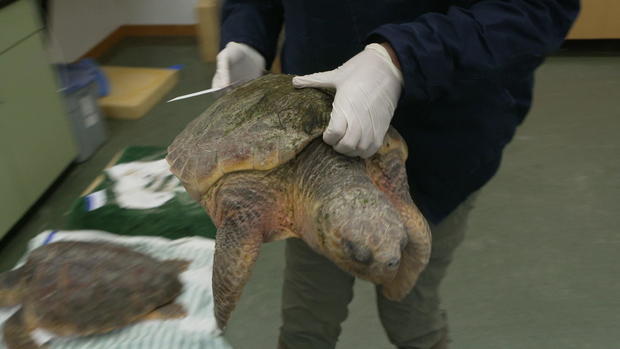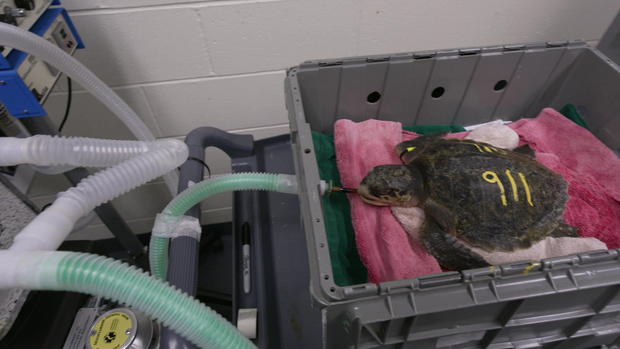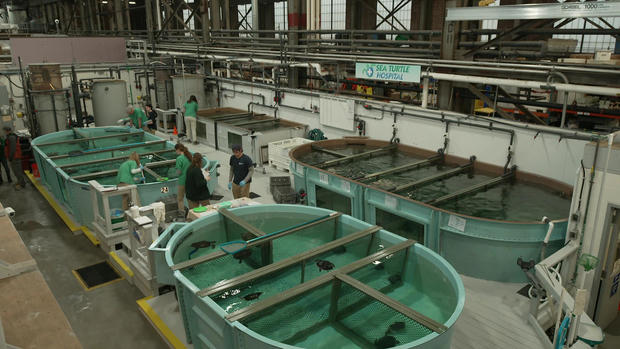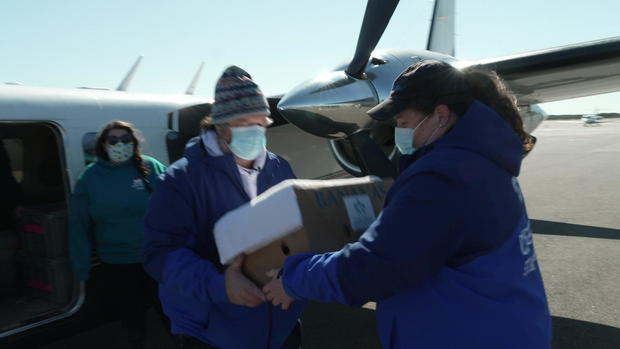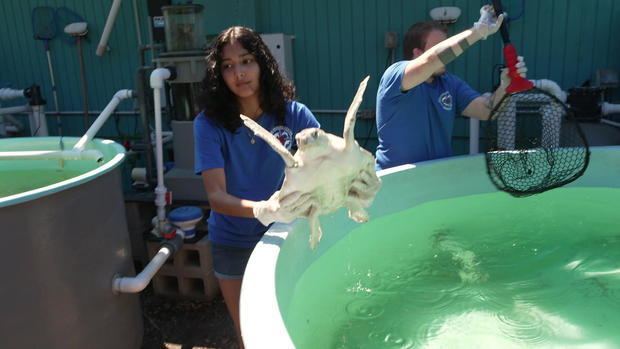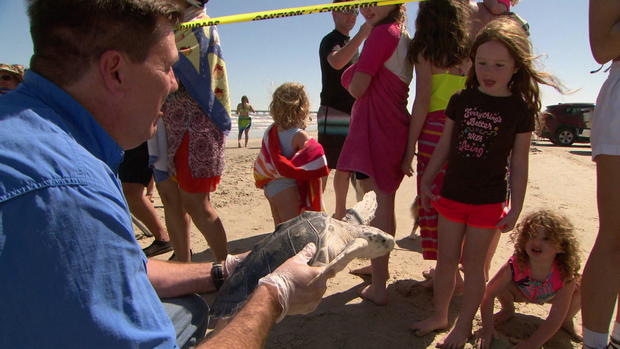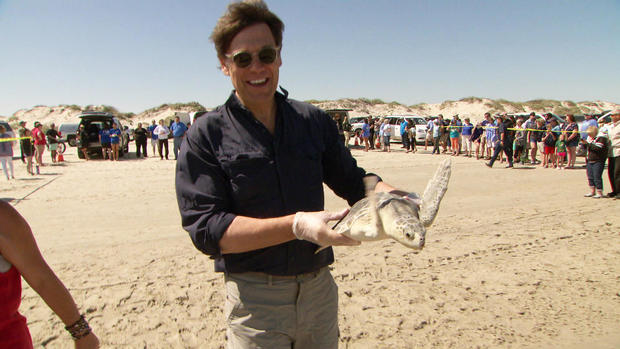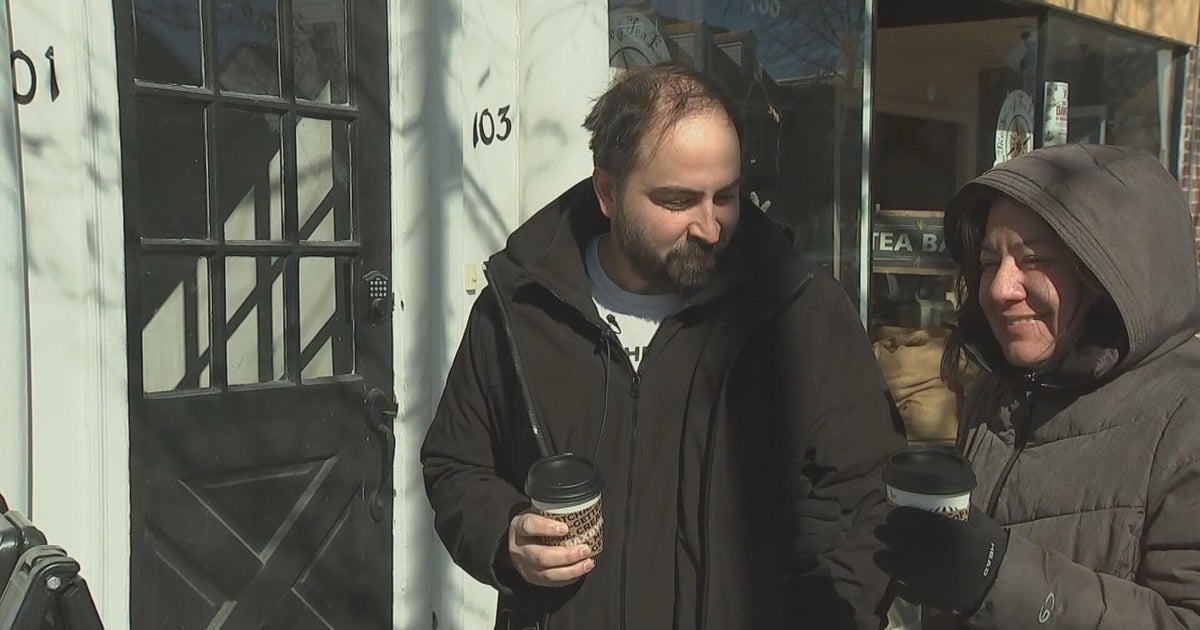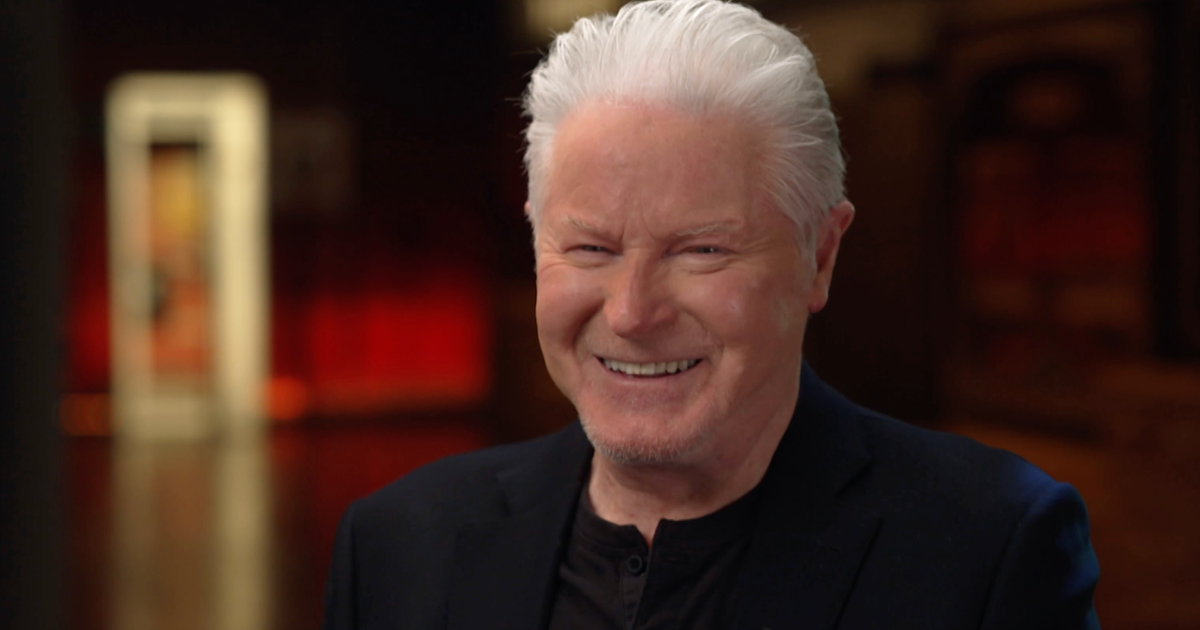Helping endangered sea turtles, by air
At first glance it can look like a morgue: sea turtles, limp and motionless. But if you look closely enough, what might look like a corpse offers a slow glimpse of life. The turtles had all washed up in Massachusetts this past December, on the windy beaches of Cape Cod Bay.
They were nearly frozen to death.
"The turtles, especially today, 38°, if that turtle sits out for two, three hours, I mean, it's gonna die," said biologist Bob Prescott. "It's just not going to recover from that kind of shock, from the cold."
The problem, though, isn't so much the cold as it is our ever-warming oceans.
Prescott, director emeritus of the Massachusetts Audubon Wildlife Sanctuary in Wellfleet, says the Gulf of Maine (which includes Cape Cod Bay) is now one of the fastest-warming bodies of ocean water in the world. Now, turtles like warm water, but they're staying up here too long. By mid-November, the temperature starts to drop too fast for these cold-blooded reptiles to handle, and volunteers are finding more and more of them washed ashore in a hypothermic-state called cold-stunning.
All sea turtles are in real trouble, but by far the worst off are Kemp's Ridley turtles, the most critically-endangered sea turtle in the world. Since the 1970s they've been washing ashore, about a few dozen per year.
Prescott found his first turtle in 1974. "Now, you know, we're up over 750, 760 turtles [a year]," he said.
They've travelled a long way, unwittingly into danger. Their nesting grounds are thousands of miles to the South along the warm beaches of the Gulf of Mexico, where Donna Shaver has spent her life trying to help the species rebound.
"If we don't help save this species, we lose a piece that enriches us," Shaver said. She is head of the Turtle Rescue Group at Padre Island National Seashore in Texas. "There's a whole variety of things that can harm them: Oil spills, boat strikes, red tides, entanglement in debris, ingestion of debris," she said.
Which is why all the urgent care they're getting back up North is more important than ever.
Most have at least some degree of pneumonia. Some are so bad they have to be put on ventilators just to breath. But they're also suffering from a lot of other things – fractured bones and dehydration, for example.
The Animal Care Center for the New England Aquarium, a state-of-the-art facility just outside Boston that specializes in treating cold-stunned sea turtles from Massachusetts to Maine, has an 80% success rate at bringing these turtles back from the brink.
Biologist Adam Kennedy said turtles are remarkably resilient. Treatment can last up to two years. But Kennedy can really only manage between 40 and 80 turtles long-term.
And with the warming waters, hundreds are now getting trapped every year, and that's too many four-flippered patients for any one rehab to oversee.
It's basically a mass casualty event. They need other hospitals to help, but that left Bob Prescott with a question: "How do you get a turtle from here, to there?"
The answer: Give turtles a ticket to fly.
Ken Andrews is vice president of a unique non-profit called Turtles Fly Too. "There is no agency," he said. "There's no staffing. There's no funding. There's nothing there to make this mission happen. And these turtles will die if somebody like Turtles Fly Too doesn't jump in to help."
Cowan asked, "So this is, in a lot of ways, like a life flight?"
"It is a life fight, it's a med-evac flight, absolutely," Andrews replied.
It could never happen unless hundreds of pilots were willing to volunteer their time, their planes, and their fuel to rush the rescued turtles to willing rehab facilities all around the country.
"Where do you guys get your funding?" Cowan asked.
"What funding? I wish!" Andrews laughed. "We desperately need it. Our pilots that are flying these missions are pulling $1 million out of their pocket to fly these missions every year for us."
On this particular mission, Andrews, with his dad as co-pilot, will fly more than 2,000 miles, from Boston, to Atlanta, then on to Gulfport and finally Dallas, dropping off 44 sick sea turtles along the way, in hopes that one day they'll be well enough to be released.
According to Andrews, "Ninety percent of the turtles that we've moved to rehab have ended up back in the ocean."
Cowan checked in with some lucky passengers that had landed at the Texas Sealife Center in Corpus Christi Texas back in 2021, courtesy of Turtles Fly Too.
Veterinarian Tim Tristan, the center's director, said it took a while, but with good care, and the help of volunteers, these turtles were finally ready to go home again. "If they can make it through our front door, we have a pretty good success rate with getting 'em turned around and getting 'em back out into the wild where they belong," he said.
A crowd had gathered at the beach of Padre Island. Most never get to see a Kemp's Ridley turtle – there are far too few – but on this day there were a few more.
Biologist Donna Shaver said this release is modern conservation in action. "They take with me their hopes, hopes for the next generation," she said.
Cowan had the privilege of escorting one turtle to the water's edge. "Look at this! Like, how cool! Look buddy, you're going home!"
We humans have not always been kind to the sea and those that dwell in it. But on this day it was humans (not me, but the hundreds of veterinarians, biologists, volunteers, and pilots) who all came together to give these critically-endangered sea turtles what they rarely get … a second chance.
Who says you can't go home again?
For more info:
- Turtles Fly Too
- Massachusetts Audubon Wellfleet Bay Wildlife Sanctuary, Wellfleet, Mass.
- New England Aquarium, Boston
- Division of Sea Turtle Science and Recovery, Padre Island National Seashore, Texas (National Park Service)
- Texas Sealife Center, Corpus Christi, Texas
Story produced by Sari Aviv. Editor: Carol Ross.
See also:
- Scientists on Long Island nursing back to life cold-stunned sea turtles
- World's smallest and most endangered sea turtle found nesting on Louisiana islands for first time in 75 years
- Why the endangered green sea turtle is losing its male population ("CBS This Morning")

